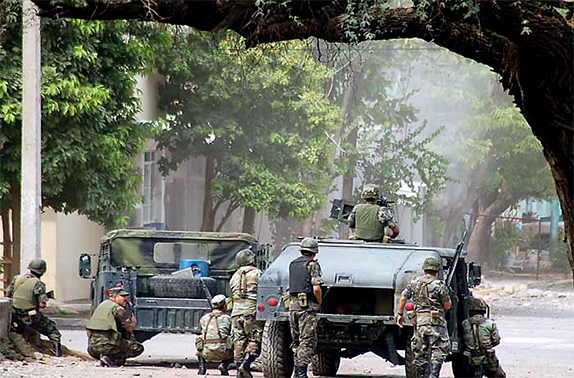
As a massive federal police and military deployment gains momentum in the Mexican state of Michoacan, polemics and debate shroud the first major such operation undertaken by the administration of President Enrique Pena Nieto.
At stake in the campaign is not only the reassertion of state power, but also the strategic control of the Pacific coastal port of Lazaro Cardenas, one of the key portals of the Asia/NAFTA economy, as well as the productive mountains and farmlands whose products and people travel a network of highways leading across Mexico and into the United States.
With upwards of 10,000 federal forces now deployed, along with perhaps equal numbers of gunmen from the Knights Templar syndicate and opposing, civilian self-defense groups, Michoacan is the scene of a “low-intensity war” that will soon witness drones, massive telecommunications intercepts and commando operations, predicted Gerardo Rodriguez Sanchez Lara, director of the private Mexican Human Security firm.
On Mexican television, commentators openly compare Michoacan with Syria, Colombia and the balkanized states of the former Yugoslavia.
Defining Michoacan a “failed state” in all senses, pundit Eduardo Healy called for considering the suspension of civil liberties. He also lashed out against the state’s “out-of-control” teachers, who have been waging a year-long struggle against the Pena Nieto administration’s education reform.
Michoacan has very active and militant teacher and other social movements, and it remains to be seen if civil society organizations will now be in the cross-hairs of intensified government operations officially targeted at organized crime.
While the Mexican government has yet to adopt the measures advocated by Healy, proposals for an iron-fist strategy are part of the public discourse.
A deeper analysis of the Michocan crisis reveals a distinctly Mexican one with strong if not overriding U.S. influences that have integrated the local economy into an export flow of products and people northward to the great market beyond the Rio Bravo.
In a recent column, Gerardo Rodriguez noted that the crisis in Michoacan finds its historic origins in “problems of territorial control among families and caciques (rural bosses) that dispute the natural richness and political control of its communities since the colonial epoch.”
Politically, the crisis taints all the major Mexican political parties, which either had a direct hand in criminal activities or tolerated the emergence of a parallel state under their noses, especially in the post-NAFTA era when Lazaro Cardenas emerged as a prize Pacific trade hub while a historic decline of the legal rural economy deepened.
“Some federal resources began to come to the Apatzingan Valley (Michoacan) barely five years ago,” a resident was quoted in the Mexican press. “Previously, only illicit money moved the region. The drug traffickers not only invested, but they avoided kidnappings, robberies and extortions. They were a government over the government, and they benefited everyone.”
Since 2000, the power of organized crime has steadily overtaken state authority. The decomposition of state power occurred during two presidential administrations headed by the National Action Party (PAN) and one by the Institutional Revolutionary Party (PRI), two state governments dominated by the PRI and two by the Party of the Democratic Revolution (PRD), and municipal governments of various political stripes.
Although former Mexican President Vicente Fox continues berating his successor and fellow Panista, Michoacan son Felipe Calderon, for the security disaster, a more objective review of the historical record shows that narco-violence surged in Michoacan and other parts of the nation precisely during the Fox administration, which allegedly colluded in or covered up the violence, according to numerous reports.
Under Fox’s watch, a new cartel, La Familia Michoacana, from which the Knights Templar later arose, formed and quickly consolidated an unprecedented degree of power in a state where illict drug cultivation and trafficking had long existed but was kept under control to an extent.
“The Family took over entire city governments,” columnist and analyst Jenaro Villamil recently wrote. ”It bought mayors, legislative candidates, and organized the direct exortion of hundreds of merchants.” Michoacan residents, in essence, were burdened with a double taxation system: one payment to the weak, official government and another one to a strong, unofficial one.
Not surprisingly, many residents abandoned the state, an entity already considered one of the biggest migrant-expelling regions of Mexico. According to a recent media report, hundreds of applications for U.S. political asylum are pending from the conflictive Tierra Caliente region of Michoacan.
“People are arriving every day, ever since the violence began there,” a California resident identified as Hector said. The 14-year resident of the Golden State said a dozen relatives seeking refuge had crossed over to the U.S. in recent months.
Nearly a decade later, a combination of finger-pointing, hand-wringing, bravado, and mea culpas are emanating from the governing elite, with burning constitutional, political and public safety questions on the table.
Although the Calderon administration oversaw the detention of dozens of mayors accused of complicity with organized crime in the ill-fated “Michoacanzo” of 2009, the cases fell apart and no other high officials were held accountable for a melt-down of public safety and governance.
Some members of the PAN and PRD parties have clamored for the federal Congress and President dissolve the Michoacan state government, a power permitted under the Mexican Constitution and which has been used in the past, most notably in the neighboring state of Guerrero.
But any movement toward dissolving the PRI–ruled state government was forestalled when President Pena Nieto designated Alfredo Castillo Cervantes the special commissioner for Michoacan this month. The 38-year-old Castillo was handed the heady tasks of restoring order and reconstructing the tattered social fabric in the western state of almost five million people.
While Castillo’s appointment saved face for Pena Nieto’s PRI party and embattled Michoacan Governor Fausto Vallejo, whose 2011 election campaign was allegedly supported by the Knights Templar, Castillo’s mission effectively puts Mexico City in the political driver’s seat. Castillo, however, is careful to guard political forms and insists he is working in coordination with Vallejo and other political leaders, not displacing them. Otherwise, the old image of a heavy-handed Mexico City trampling over an unruly province could enter the public perception of the crisis.
“In reality, the President and the PRI recognize that the powers in Michoacan have practically disappeared, but they don’t say it openly,” said PAN Senator Salvador Vega Casillas, who added that Vallejo should resign so the Michoacan state lawmakers can elect a new governor to serve out the constitutional term.
In a similar vein, PRD Senator Dolores Padierna questioned the constitutionality of Castillo’s powers, urging that the formal dissolution of the state government proceed. The Mexico City senator’s proposal, however, is unlikely to gain traction.
The eyes of the nation are on Castillo. A lawyer by profession but a troubleshooter by trade, Castillo is a man of the state, having served both PRI and PAN administrations in different capacities.
During the Fox administration, Castillo was an advisor to Attorney General Rafael Macedo de la Concha, an army general who eventually resigned after Fox administration attempts to force then-Mexico City Mayor Andres Manuel Lopez Obrador from office backfired and provoked massive demonstrations.
Last year, Castillo helped prepare the legal case for the Pena Nieto administration against longtime power broker and national teachers’ union leader Esther Gordillo, who is now imprisoned on corruption charges.
Now, as special commissioner for Michoacan, Castillo is tasked with restoring some semblance of order to a state where dozens of security agencies, cartels and community self-defense organizations make the place an armed camp.
Together with Interior Secretary Miguel Osorio Chong, Castillo has the future of the Pena Nieto administration in his hands. Ironically, Michoacan is where Felipe Calderon unleashed his heavily criticized “drug war,” and events in the impoverished state now also stand out as a defining moment for Calderon’s successor.
It’s too early to predict how the situation on the ground will evolve, but if Pena Nieto’s administration meets public demands of detaining Knights Templar leaders, the president’s fortunes will certainly benefit.
Hipolito Mora, leader of the La Ruana self-defense group which formed to expel the Knights Templar in a citizen uprising, praised the federal deployment but said his organization would keep its arms for a “little while longer,” or at least until the capos are arrested.
As the federal operation entered its second week, traffic was reported flowing on previously dangerous highways and classes had reportedly resumed in Apatzingan, epicenter of the violence. Nonetheless, a fed-up public expects significant changes and actions, and very soon.
The employees of an Apatzingan pharmacy that suffered an arson attack last week staged a march January 20 to demand genuine security. Cristian Pineda, spokesman for the workers, said continued insecurity was causing economic hardship for the locals.
“It’s not just us,” Pineda said. “Many people in the city can’t work and don’t have stable employment, due to the problems they are suffering from the insecurity.”
Columnist Julio Hernandez Lopez characterized the current situation as a kind of win-win truce in which the government flexed its power, the self-defense forces held on to their weapons and the Knights Templar, though suffering some detentions and dislocations, stayed largely intact.
“The state government has been practically folded and Osorio Chong, wagering his future political capital, is winning until now-at least in terms of appearances,” Hernandez wrote.
Sources: Teleformula, January 20, 2014. El Universal, January 20, 2014. Article by Julian Sanchez. CNN en Espanol, January 19, 2014. Tribuna de la Bahia/Agencia Reforma, January 17, 18, 19, 2014. Articles by Claudia Guerrero, Adan Garcia, Angel Villarno, Benito Jimenez, Gerardo Rodriguez Sanchez Lara, and editorial staff.
Televisa, January 17, 2013. La Jornada, January 16 and 20, 2014. Articles by Julio Hernandez Lopez and Arturo Cano. Proceso/Apro, December 29, 2013; January 9, 12, 14, 16, 17, 2014. Articles by Ezequiel Flores Contreras, Jose Gil Olmos,
Veronica Espinosa, Jenaro Villamil, and editorial staff.
Photo: Mexican Army soldiers during a confrontation in Michoacán in August 2007. From Wikipedia article on the Mexican Drug War.



Responses to “Mexico: The Politics of a State Meltdown”